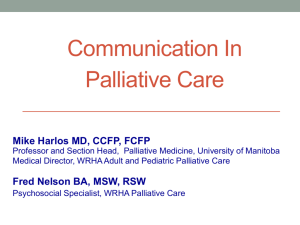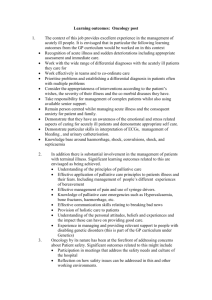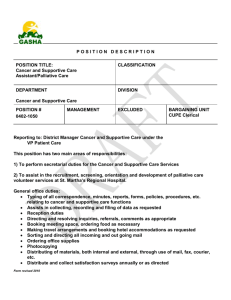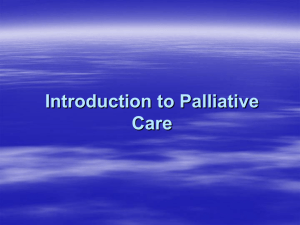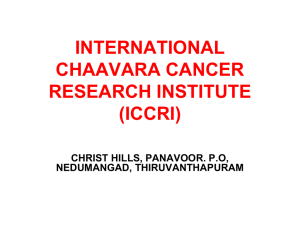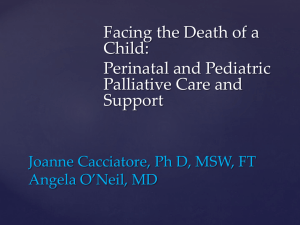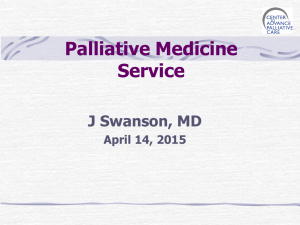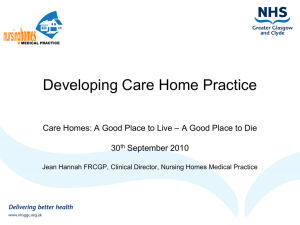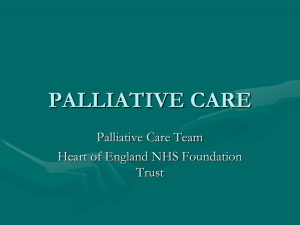Speakers Kit
advertisement
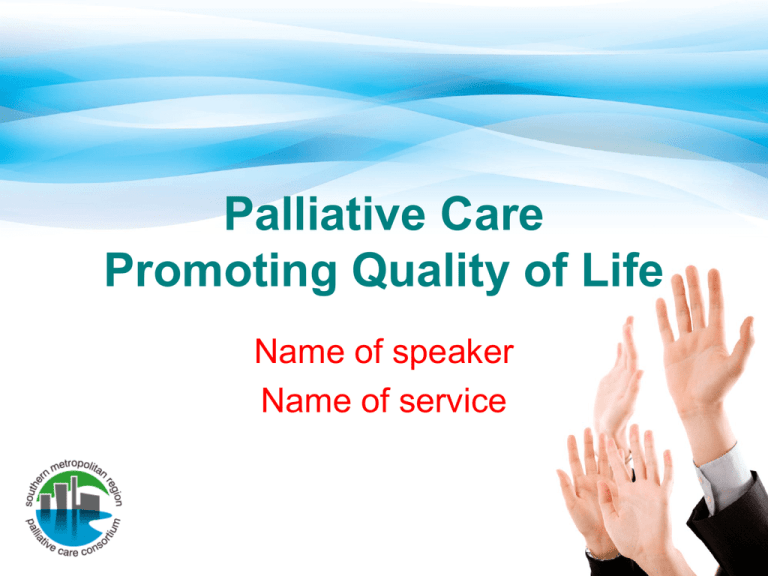
Palliative Care Promoting Quality of Life Name of speaker Name of service Content – – – – What is palliative care? What do palliative care services do? What can I do to help? Contacts and resources Some alarming statistics We have a 25% chance of developing hypertension during our life We are about 5 times more likely to have a stroke if we smoke We have a 30% chance of developing some form of cancer in later life We have a 100% chance of dying at some stage in our life!! What is palliative care? • It’s specialised health care provided by experts who are experienced in supporting people living with a terminal illness and their families. • Palliative care can include: – – – – pain and symptom management help with spiritual issues counselling practical support Who needs palliative care? • People living with a terminal illness • The families and/or carers of people living with a terminal illness • People whose treatment has changed from finding a cure to improving the quality of daily life • People who need more specialised support than they can receive from their general practitioners and families Palliative Care Services in the Southern Metropolitan Region • Inpatient services – Calvary Healthcare Bethlehem, Caulfield – Southern Health, Monash and Casey – Peninsula Health, Frankston • Community PC Services – Calvary Bethlehem, inner south – Peninsula Hospice Service, Frankston and Mornington Peninsula – South East Palliative Care, outer south east Insert name of your palliative care service General Information • Location • History • Funding What do we do? We provide expert palliative health care and practical support to people living with a terminal illness, in their own homes. This includes: - nursing and medical care - counselling and welfare support - art and / or music therapy - pastoral care - client care volunteer support - bereavement support We also support families and carers of people living with a terminal illness Where do our clients live? We provide services for people living in: List LGAs Some statistics • Number of service users • Number of visits per service user • Different demographic groups (ie children, people from CALD) • Number of volunteer services provided etc What do we need to do our job? • Qualified and experienced staff and volunteers • A supportive community • Cars to get staff to client’s homes and drive people to groups and appointments • Venues to conduct group and individual support work and administrative activities • Equipment – hired for clients with funding from government and the community • Funds to support staff and volunteer training and professional development • Funds to reimburse volunteers for their travel expenses Where you come in Most people who are living with a terminal illness spend their time with family and friends, outside the health care system. Many people are not prepared when they find themselves in this situation. We need to re-learn how to care for each other – for people who are dying and for people who are left behind. (Adapted from Kellehear 2005). Where you come in.. continued – Most people want to remain connected to their local communities when they are dying. – Services aren’t enough on their own and can’t provide everything people need. Volunteers Trained volunteers help clients and their families, according to needs. This may involve sitting with a person while the carer goes out, driving the client to a medical appointment or simply providing company. Volunteers may also give administrative support, help with support groups and visit clients in the hospital. A story Tell one of your stories here Frequently asked questions • • • • How do people get referred? When do people get referred? What does the service cost? How can you help? How you can support our service • Become an advocate by telling others about our service. • Attend fundraising events. • Join a fundraising auxiliary. • Buy fundraising merchandise. • Make a donation or bequest to the service in your will. • Establish a regular donation (quarterly, annually). Become a volunteer! Contact • Phone • Email • Web site • For donations contact • To become a volunteer contact Interesting websites • www.smrpalliativecare-consortium.org.au • www.pallcarevic.asn.au • www.palliativecare.org.au Thank you for your time!
